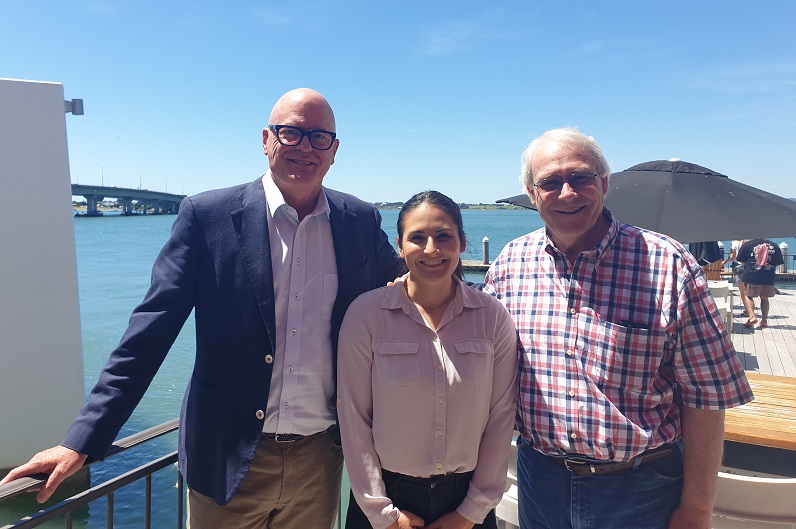
by Peter Wren-Hilton | Feb 13, 2024 | Western Growers
Yesterday, Dennis Donohue, Director, Western Growers Center for Innovation & Technology and Dr. Jeana Cadby, Director, Western Growers Climate & Environment (Science), flew into New Zealand from California. The visit is intended to provide insights into some of New Zealand’s great agricultural science and capability, as well as showcasing real world examples of its practical implementation.
The visit has another purpose.
Wharf42 has enjoyed a long history with Dennis and the team at Western Growers. For some context, Western Grower members produce over 50% of all fresh produce (fruit, vegetables, nuts and organics) in North America. Plus a number of Western Grower members have extensive growing interests in Mexico, Peru, Chile and broader parts of LATAM.
We first met in 2015. Last year, we co-hosted the 2023 Salinas Biological Summit. In June this year, we’ll be co-hosting the 2024 Summit. The partnership between Wharf42 & Western Growers led to the creation of Platform10, an international, multi-year collaboration that will accelerate promising biopesticide companies, rigorously assess products, enhance grower confidence, and facilitate market development and adoption.
For Californian, New Zealand and growers everywhere, this initiative has huge significance. Growers are up against mounting pest and disease challenges due to climate change, reduced efficacy, and diminishing availability of traditional pest control tools. The specialty crop / fresh produce industry in particular requires new crop input technologies due to governmental regulations and consumer demands. Bio-based and novel pest control options to address existing and anticipated gaps in pest management are sorely needed to ensure that our growers are properly equipped with the tools to address these challenges.
Given Wharf42’s home base, it was appropriate that Dennis & Jeana had the opportunity to meet Todd Muller (pictured) yesterday in Tauranga. Todd is Chair of Priority One, the Western Bay of Plenty’s Economic Development Agency (Wharf42 is a long-time member) and a former senior member of both Fonterra & Zespri leadership teams. Over an hour, interesting insights and thoughts were shared. It was clear that the strong relationship being developed between New Zealand & California is creating new and potentially significant opportunities in the area of climate smart agriculture collaboration. CDFA Secretary Karen Ross’s attendance at the 2035 Oceania Summit in Auckland in 2022 was testament to that.
In this week’s edition of Farmers Weekly, Daniel Eb asked the question; ‘Does New Zealand have the courage to punch above its weight’? I would like to pose a related question. What role can New Zealand Inc. play in the development of the global Platform10 program?
It’s going to be an interesting few days ahead.
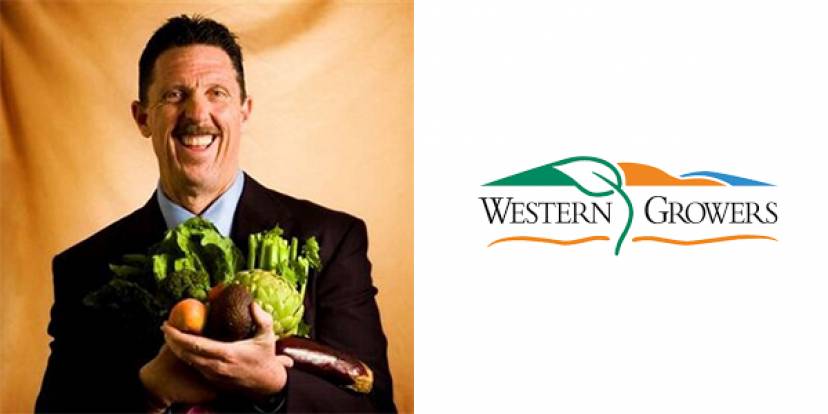
by Peter Wren-Hilton | Sep 10, 2022 | Western Growers
I was honoured recently to be invited by Western Growers to join the online tribute to the late Hank Giclas, former Director of Innovation at WG.
I first met Hank back in 2015 when I first began to focus on the emerging new investment asset class, called agritech. I was based at the time in Sunnyvale, Silicon Valley, and traveled to the Western Growers Innovation & Technology Center in Salinas, Northern California. It was the beginning of a long-standing relationship that continues today.
I met Hank during one of those early visits and together with Center Director, Dennis Donohoe, we began to discuss how the Center and New Zealand’s emerging agritech sector could potentially collaborate. In 2018, when Jacqui and I finally established Agritech New Zealand, Hank flew from the US to join us in Tauranga for the launch. I remember well our visit to the Plant & Food Research facility at Te Puke where we spent time on a kiwifruit orchard. Hank was a tall man and had to constantly keep his head low to avoid banging into the canopy. We went onto the PFR building and tasted some of Zespri / PFR’s experimental kiwifruit cultivars. For Hank, it was an important moment. He got to understand the valuable connection that exists between research and industry in New Zealand. It was a lesson he took back to the States.
Hank stepped down from his role at WG at the beginning of the pandemic. Whilst we did not meet again because of closed borders, my memories of Hank are of a gentle man who had a fierce interest in the future of his industry and a solid understanding of the growers who worked in it. He is already sadly missed.
I’m honoured to share the online tribute below:
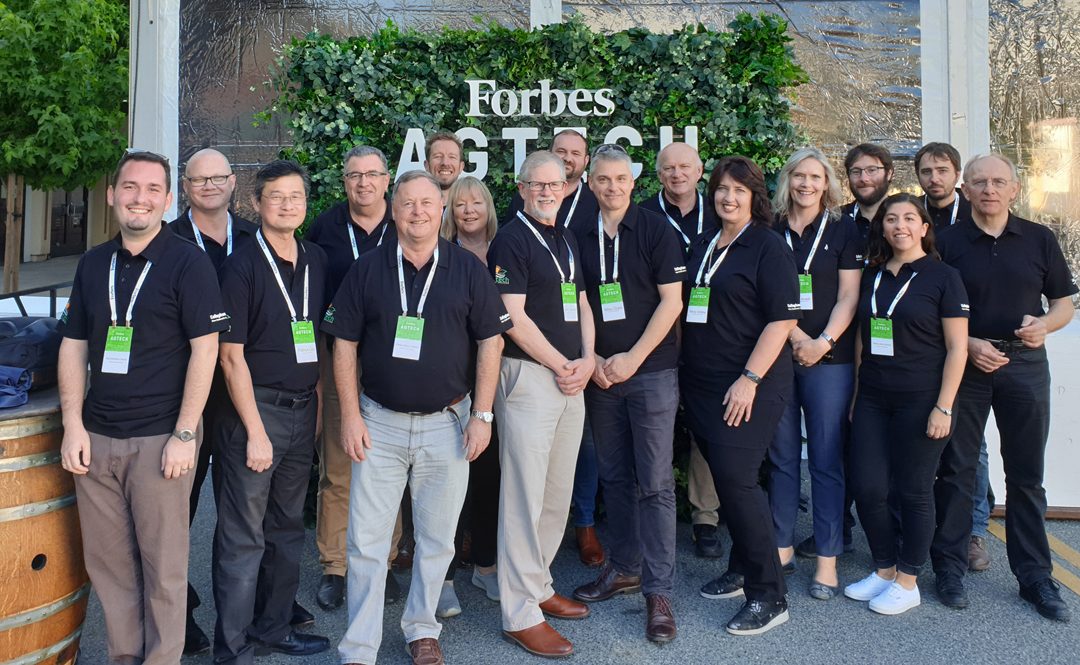
by Peter Wren-Hilton | Sep 13, 2021 | Western Growers
Yesterday, I published the post; ‘Introducing the Western Growers CIT Global Advisory Board’.
As indicated in the post, it’s an initiative that I have been working on with the Center’s Director, Dennis Donohue, for some time. The opportunity to build a ‘Star Alliance’ global network of locally-connected entrepreneurs and investors with a shared common interest drove this work.
The make-up of the Advisory Board reflects this purpose;
Rob Ward, (UK), Founder of ForwardFood.Tech and Agritech Lead at the UK Department of International Trade’s Global Entrepreneur Programme
Ethy Levy, (Israel), Founder of Impact Innovation Israel and Fund Manager at Kinneret Impact Ventures
Sarah Nolet, (Australia), Co-founder of AgThentic and General Partner at Tenacious Ventures, Australia’s leading agrifood tech venture fund
Francisco Jardim, (Brazil), General Partner at SP Ventures and Managing Director, the San Paulo Innovation Fund
Larry Taylor, (US/Singapore), Co-Founder of the Yield Lab, Asia Pacific
Rich Moran, (US), Former Partner at Venrock & Accenture, Managing Partner at Tonic BioVentures and best-selling author
Peter Wren-Hilton (NZ) Founder of Wharf42 & Dennis Donohue (Director, Western Growers CIT)
Wearing my regional hat, I believe that the establishment of the Advisory Board and its purpose as explained in yesterday’s post, provides a major platform for ANZ agritech companies seeking to establish a serious footprint in North America. It’s why Sarah and I will be communicating these opportunities to both Agritech New Zealand and the Australia Agritech Association. It’s these two industry organisations that will be able to share these opportunities with members to leverage their impact.
Looking further ahead, the opportunity to engage and connect with some seriously well-connected regional representatives will further increase the opportunity for increased global collaboration. This was a major part of yesterday’s discussion.
I very much look forward to working with Dennis and the team as we build out a lasting framework that can have a really positive legacy. These are exciting times!
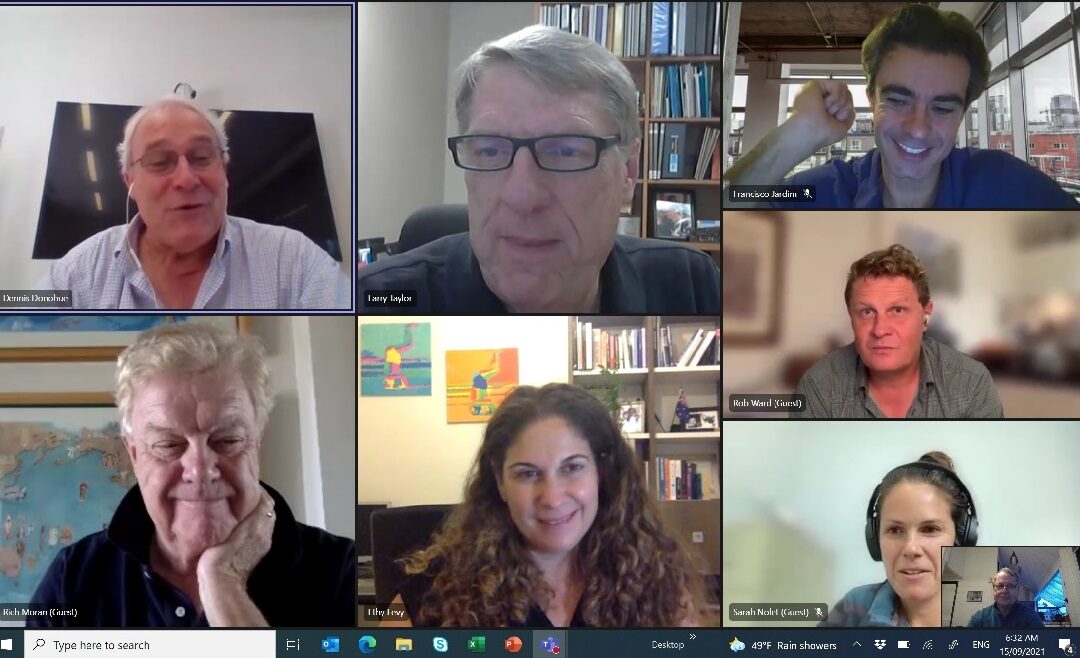
by Peter Wren-Hilton | Sep 13, 2021 | Western Growers
Today, the Western Growers CIT Global Advisory Board met for the first time.
It’s been a ‘work in progress’ since earlier in the year and it’s great that we have finally got it across the line. It’s been a privilege to work with Dennis Donohue, Director of the Western Growers Center for Innovation & Technology, as the Board’s co-convener and a pleasure to be working with our engaged and globally-connected colleagues.
The Advisory Board has been established to address three areas of common purpose.
- To provide agritech companies from around the world with a landing pad at the Western Growers Center for Innovation & Technology facility in Salinas, Northern California.
- To provide Western Grower members (they produce over 50% of all North American fresh produce – fruit, vegetables, nuts & organics) with solutions designed to address some of their most significant challenges. These include;
- Labor: Lack of & cost of. How to effectively increase automation across the production process
- Rapid Diagnostics: Identification and eradication of plant pests / disease that threaten food security and safety
- Water: Sustainability and resource management
- Data: Collection and management
- The building and training of an agricultural labor force for the future
- To provide the Center’s tenants with access to, and potential collaboration with, global partners
Over the coming months, the Advisory Board will be sharing some of the key challenges facing Western Grower members with the intention of generating global input. If you believe that your agritech business can help address these challenges, a call to action will include an opportunity to present your solution.
To support this, Western Growers are developing a Grower Trial Network that will enable agritech companies to test their technology in-market. Understanding the challenges from the grower’s perspective is a hugely important component in the plan. Being ‘big’ in other geographies does not necessarily guarantee domestic grower adoption in the US. Local knowledge, local visibility and access to a receptive local ecosystem all have a huge role to play.
It’s early days, but I am confident that today’s first meeting will provide significant opportunities for global agritech companies looking to expand their footprint into North America. Dennis and the team in Salinas are keen to engage. So are our colleagues who make up the Advisory Board.
For agritech companies in my part of the world, I’ll be sharing details of these opportunities with both Agritech New Zealand and the Australian Agritech Association. If you are developing solutions for the specialty crop market and want to scale offshore, I cannot really think of a better opportunity out there.
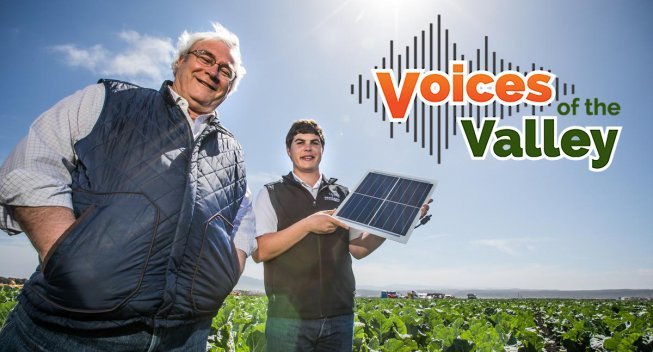
by Peter Wren-Hilton | Jun 28, 2021 | Western Growers
Last week, I spoke to Dennis Donohue, Director of the Northern California-based Western Growers Innovation & Technology Center on the Center’s ‘Voices of the Valley’ podcast. It gave me the opportunity to share New Zealand’s agritech story as well as discuss a number of emerging global trends.
I first caught up with Dennis back in 2015. I was based in Silicon Valley at the time and became aware of this new investment asset class called ‘agtech’. What I learnt was that very little of this investment was finding its way across the Pacific. I returned to New Zealand in late 2015 and the rest as they say is history. Today, Agritech New Zealand is a strong industry-led organisation and there is no lack of capital for globally-focused investable agri-technology companies in the country.
In the podcast, we talked about three key focus areas for the Center (plus, I’ll add a fourth); These are labor (lack of and cost of), food security and rapid diagnostics. The fourth reflects the work and support of Karen Ross, the California Agriculture Secretary, who together with Dennis and the team at WG are looking at longer-term workforce skills and talent training. As robotics and automation begin to play a bigger role in the field, growers and their staff need to be up-skilled to operate in this significant emerging technology-driven environment.
During our call, my current focus on the impact of our changing climate also resonated. Water in states such as California, Nevada & Arizona is a major consideration for growers. I’ve seen at first hand in high-production areas such as the Central Valley and the Salinas Valley, the ongoing impact of drought. As I write this post, the western seaboard of the US is suffering some of its highest June temperatures on record. Seattle, in the northwest, hit 37.2c yesterday. Further north, Lytton in British Columbia (Canada) reached 46.6c. A taste, I suspect, of what’s to come with our changing climate.
In the podcast, we spoke about some of the emerging global trends and specifically about some of the specialist strengths of different national and regional agritech hubs. Dennis and I speak frequently on this subject. Western Growers understand that they need to be aware of what is happening globally to address some of their local challenges. The Center and its team are very open to this conversation.
Next month (travel bubble willing), I’m heading across the Tasman to keynote at South Australia’s AdvanceAg conference. Once again, it’s not just about sharing our story. It’s about identifying opportunities for collaboration across borders to address some of the major challenges that we discussed on the podcast last week. As the impact of climate change, labour shortages and the prospect of feeding a rapidly growing global population become more urgent, developing these collaborative cross-border frameworks will become ever more important.
If you want to check out last week’s ‘Voices of the Valley’ podcast, you can listen to the recording below.
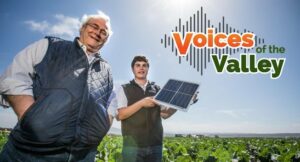
Audio Player
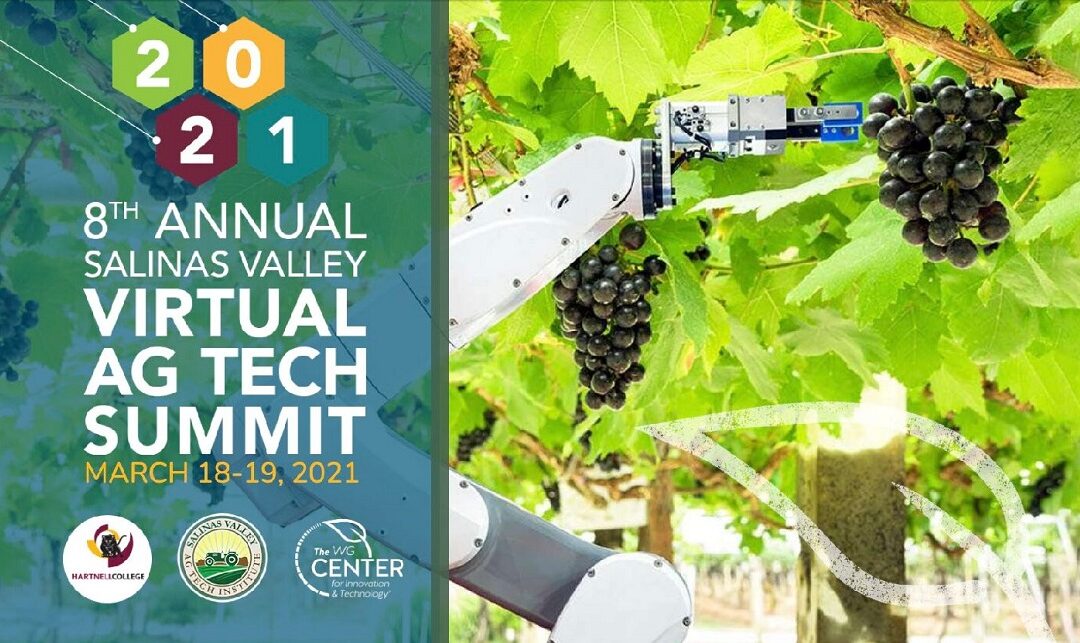
by Peter Wren-Hilton | Mar 8, 2021 | Western Growers
Next week, the Western Growers Center for Innovation & Technology are co-hosting a two-day Virtual AgTech Summit with Salinas-based, Hartnell College.
The major theme of the event is the importance of education and the need to up-skill today’s agriculture workforce. It’s the strong belief that the agtech revolution of today, requires a ‘New Kind of Worker’ for tomorrow. With the emergence of game-changing robotic and automation technologies, many traditional manual roles will now become hybrid – humans and machines working together.
Dennis Donohue, Director of the Western Growers Center, will be joined by the California Secretary of Agriculture, Karen Ross. Together they will discuss the role of education and the significance of meeting today’s and tomorrow’s workforce needs. Wearing my New Zealand hat, I know that this is a conversation that is already underway. As the impact of automation increases across the production supply chain, so is the need to up-skill the workforce.
The Summit is also introducing the audience to opportunities in Mexico and LATAM. The reality is that a number of Western Grower members, particularly in California, Nevada and Arizona have moved south of the US border into Mexico and further south to LATAM. This region is growing in global significance. Once again, wearing my New Zealand hat, the Mexican and LATAM opportunity is being actively investigated by New Zealand Trade & Enterprise.
The discussions next week will provide further input into the opportunity. From my own visit to Argentina in 2018 and discussions with folk in Chile, Columbia, Brazil and Mexico more recently, I can absolutely confirm this interest. The sessions next week cover both the challenges facing growers in this important region as well as an overview of the emerging start-up scene.
I strongly urge anyone interested in learning more about just how education is going to play an ever more important role in the development of the agricultural workforce, as well as get a better understanding on the emerging opportunities in Mexico and LATAM, to register for this Summit.
You can register free of charge today at www.salinasvalleyagtechsummit.com







